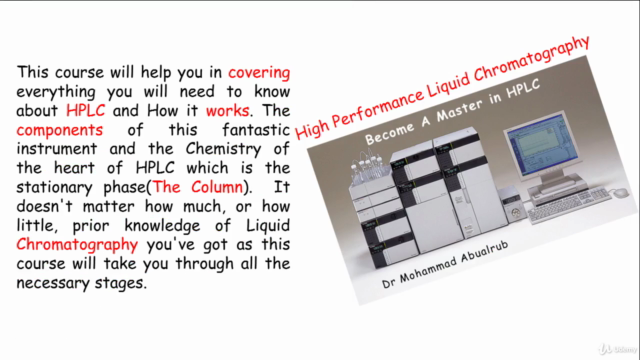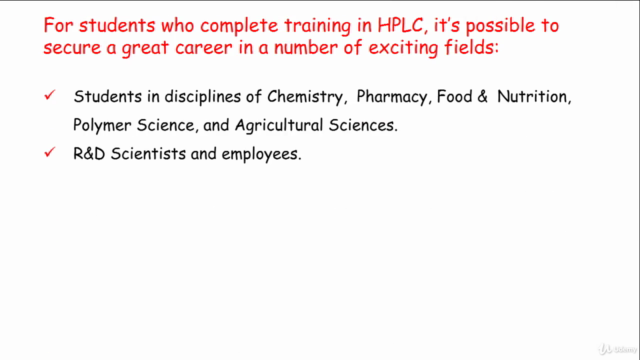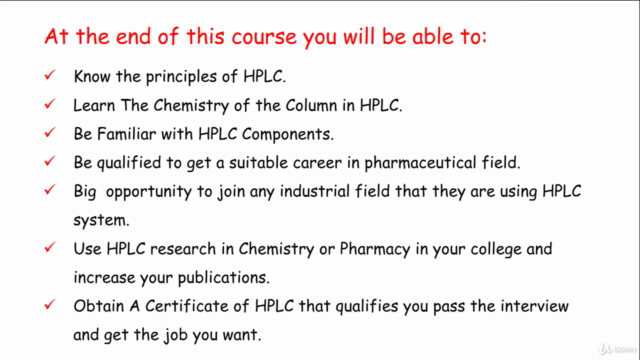Become A Master in HPLC Technique - (Liquid Chromatography)

Why take this course?
🌟 HPLC Mastery - A Journey to Mastering High-Performance Liquid Chromatography (HPLC) 🌟
Are you looking to master the art of HPLC? This comprehensive course is designed to provide you with a thorough understanding of high-performance liquid chromatography, an essential technique in analytical chemistry. With a focus on practical applications and detailed explanations, you'll gain the confidence and skills needed to perform HPLC analysis effectively.
Course Highlights:
-
Introduction to Liquid Chromatography: Get acquainted with the fundamentals of liquid chromatography and its significance in analytical chemistry.
-
How HPLC Works: Understand the inner workings of an HPLC system, including the principles that govern separation and detection.
-
HPLC Analysis: Learn about the different types of analysis, from routine assays to complex sample matrices, and how to interpret results accurately.
-
Components of HPLC: Dive into the specifics of HPLC's hardware and software, including pumps, injectors, columns, detectors, and data systems.
-
Column Chemistry – Stationary Phase: Explore the chemistry behind the stationary phase in an HPLC column and how it interacts with different compounds to achieve separation.
-
System Suitability: Learn to assess and validate your HPLC methods to ensure consistent, reliable results.
-
Starting HPLC System: Step-by-step guidance on setting up and operating an HPLC system.
-
Determination The Assay Using HPLC: Master the art of determining the amount of a substance in a sample using high-performance liquid chromatography.
-
Method Development: Develop your skills in creating new methods or optimizing existing ones for various applications.
Real-World Experience:
Get ready to see a real HPLC instrument in action within the analytical chemistry lab setting. Witness the preparation of mobile phases, installation of columns, and running of the system firsthand. This hands-on experience will solidify your understanding and provide you with valuable insights.
Quiz Your Knowledge:
Test your newly gained knowledge about HPLC with this quiz:
- HPLC stands for High-Performance Liquid Chromatography.
- Typical HPLC column dimensions are 4.6 mm x 150 mm or 250 mm.
- The pressure range in normal analytical separations is between 50 and 300 bar (725 to 4350 psi).
- The mobile phase used in HPLC analysis is a mixture of solvents that carries the sample through the column.
- Increase in flow rate of mobile phase leads to shorter analysis times but may result in poorer separation or peak broadening if not optimized.
- HPLC columns are generally made of fused silica due to their strength and durability.
- The most commonly used HPLC detector is the UV-Visible detector.
- The most commonly used mode of HPLC analysis is reversed-phase liquid chromatography.
- Isocratic mode of operation implies that a single mobile phase composition is used throughout the analysis.
- Retention time drifts of eluting compounds are controlled by adjusting the mobile phase flow rate, column temperature, or solvent strength.
Risk-Free Guarantee:
Enroll in this course with confidence, knowing that you have a full 30 days to review the material and apply what you've learned. If you feel that the course has not added value to your skills and knowledge within this period, I offer a personal guarantee of a full refund. Let's embark on this journey together towards mastering HPLC and unlocking new opportunities in your scientific career!
Click on the “Take This Course” button to begin your transformation into an HPLC expert. Don't wait—start succeeding today!
Course Gallery




Loading charts...
Comidoc Review
Our Verdict
While the course offers a good introduction to HPLC and covers essential topics, it misses an opportunity for deeper exploration. Users might benefit from more hands-on demonstrations and clearer audio quality to facilitate learning. The title of this course may not accurately represent its depth; renaming it as an "Introduction" could better set expectations. Despite these shortcomings, those seeking basic HPLC knowledge can still extract value from the course, but keep your expectations manageable and make use of additional resources for a more well-rounded understanding.
What We Liked
- Course provides a solid surface-level overview of HPLC, beneficial for those new to the topic or looking for a refresher
- Covers a wide range of aspects related to HPLC technique in a practical way
- Comprehensive course materials help learners grasp fundamental concepts
- Presented in a simple and easy-to-understand manner, making it approachable for beginners
Potential Drawbacks
- Some users find the instructor's heavy accent difficult to understand, affecting their overall learning experience
- Lacks deeper exploration of specific topics like column selection, suitable tests, and molecule compatibility
- Quality of video demonstrations could be clearer, with improvements needed in some scenes
- Absence of quizzes or assessments after each lecture for self-testing